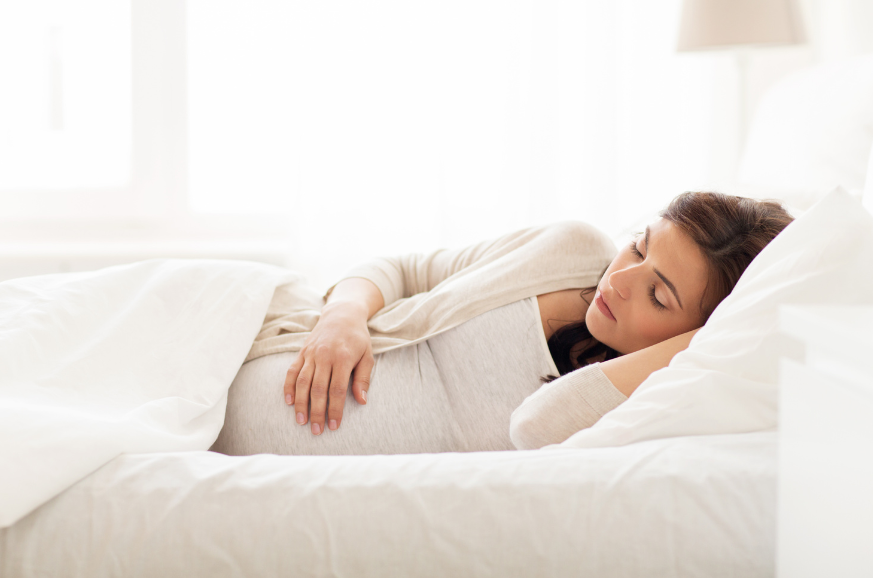Pregnant Mother's Guide to Sleeping Positions

Sleeping Positions During Pregnancy
One of the most important problems that a pregnant woman faces is figuring out how to sleep during pregnancy because of the large size of the abdomen with the growth of the fetus over time. There are many physical demands that pregnancy imposes on a woman's body, and this explains why most women need additional sleep periods to meet the needs of her body.
Sleep becomes difficult day after day with the progression of the months of pregnancy, and one study indicated that two-thirds of pregnant women suffer from sleep problems during pregnancy. One of the consequences of lack of sleep is the deprivation of expectant mothers from the ability to stay awake, pay attention, and carry out various tasks throughout the day.
Many pregnant women struggle to find a comfortable sleeping position during pregnancy due to body changes. In this article, dear pregnant mother, here is everything you need to know about sleeping positions to maintain your comfort and safety.
What is the Importance of Sleep During Pregnancy?
- Recovery: Sleep is a period for the body to rehabilitate and repair itself, and it is the time that allows the brain to build and store memories.
- Blood Pressure: Sleep is also a period during which the blood vessels repair themselves, and that is very important for a pregnant woman as she is under increasing pressure as a result of extra blood flow to nourish the fetus.
- Immune System: Helps maintain the health of the mother's immune system, which has been prepared to establish pregnancy.
- Insulin & Gestational Diabetes: Sleep affects how your body reacts to insulin because not getting enough of it when your blood glucose is high increases your risk of gestational diabetes.
Common Sleeping Positions During Pregnancy
If you are used to sleeping on your stomach, you may have to change your sleeping position to accommodate the growing belly size day after day. Here are some possible sleeping positions to consider during pregnancy:
Sleeping on the stomachMany women prefer to sleep on their stomachs, but once the fetus takes an uncomfortable position, it is impossible to feel comfortable.
The only situation in which sleeping on the stomach is more comfortable, is if you use a donut-shaped pillow that is circular and hollow in the middle.
Sleeping on your left or right sideStarting in the second and third trimesters of pregnancy, some specialists recommend sleeping on either side - preferably on the left side whenever possible - to make delivery easier for both mother and baby later on.
Thanks to the sleeping position on the left side, the placenta receives maximum flow of blood and nutrients, and the kidneys work more efficiently, which reduces swelling in the feet, ankles and hands.
As for sleeping on the right side, it is not the ideal sleeping position because it puts pressure on the liver, but sleeping on your right side is generally safe for your health if it is for short periods.
Sleeping on the backSleeping on the back is one of the most comfortable positions for most women. However, this position may be harmful to both the mother and the baby, especially in the second and third trimesters of pregnancy.
The problem with sleeping on the back is that the entire weight of the uterus, in addition to the weight of the fetus, puts enormous pressure on the mother's back, her intestines, and the vena cava, which is the main vein that carries blood to the heart from the lower part of the body.
This may cause back pain, breathing problems, digestive problems, hemorrhoids, low blood pressure, as well as reduced blood circulation to your heart and your baby, so this sleeping position is not recommended for pregnant women.
What is the best position to sleep during pregnancy?
Most professionals agree that bent at the knee while sleeping on your left side is the best position as your belly grows. Not only is side sleeping more comfortable for you, but it also improves blood flow for you and your baby.
As for sleeping on the stomach, it is also considered safe during the early stages of pregnancy, but it becomes impossible later, usually during the second trimester of pregnancy.
After the first trimester, being able to lie on your stomach becomes very difficult, on the other hand, many experts advise against sleeping on your back all night either (but don't worry if you roll over in this position).
In spite of all this, some specialists believe that a pregnant woman should sleep in any position that is comfortable for her instead of being preoccupied and worried about this matter.

How Do You Find Yourself a Comfortable Sleeping Position?
It can be difficult to adjust to side sleeping if you are used to sleeping on your stomach or back. Pregnancy can make it difficult for you to find a comfortable sleeping position, regardless of whether you normally sleep on your side.
However, there are some techniques that can help you reduce discomfort and increase your chances of getting a good night's sleep.
- Bend your knees: Doctors recommend sleeping on your side with one or both knees bent to support your back.
- Use pillows: Place a pillow between your legs, your lower back, or your lower abdomen to reduce discomfort and reduce pain. You can also try a full-body pillow, some of which are specially designed to support mothers during pregnancy.
- Find a comfortable mattress or mattress topper: Materials that relieve pressure points, such as egg carton mattress toppers, may help relieve side-sleeping hip pain.
- Elevate your upper body: If you suffer from heartburn at night, elevate the edge of your mattress or bed as this may help you sleep in a slightly upright position which will relieve symptoms.
- Sleep on your left side: This position is very beneficial for the mother. It provides maximum blood outflow from the inferior vena cava.
In order for the pregnancy period to be an easy experience for you, try to take more hours of nap sleep. A study showed that if you slept for about 8 hours before pregnancy, your sleep time during pregnancy may increase to about 12 hours.

Conclusion
The vast majority of pregnant women have trouble sleeping, so don't worry if you don't get as much sleep as you did before pregnancy. However, studies have shown that women who sleep less than six hours a night are exposed to longer delivery hours, and most often the doctor resorts to a caesarean section with them.
If you have difficulty sleeping or suffer from any other symptoms of sleep disorders, you should consult a doctor because some cases increase the risk of pregnancy complications, and the health care provider can treat pregnancy-related sleep disorders such as: obstructive sleep apnea, heartburn, and restless legs syndrome.










